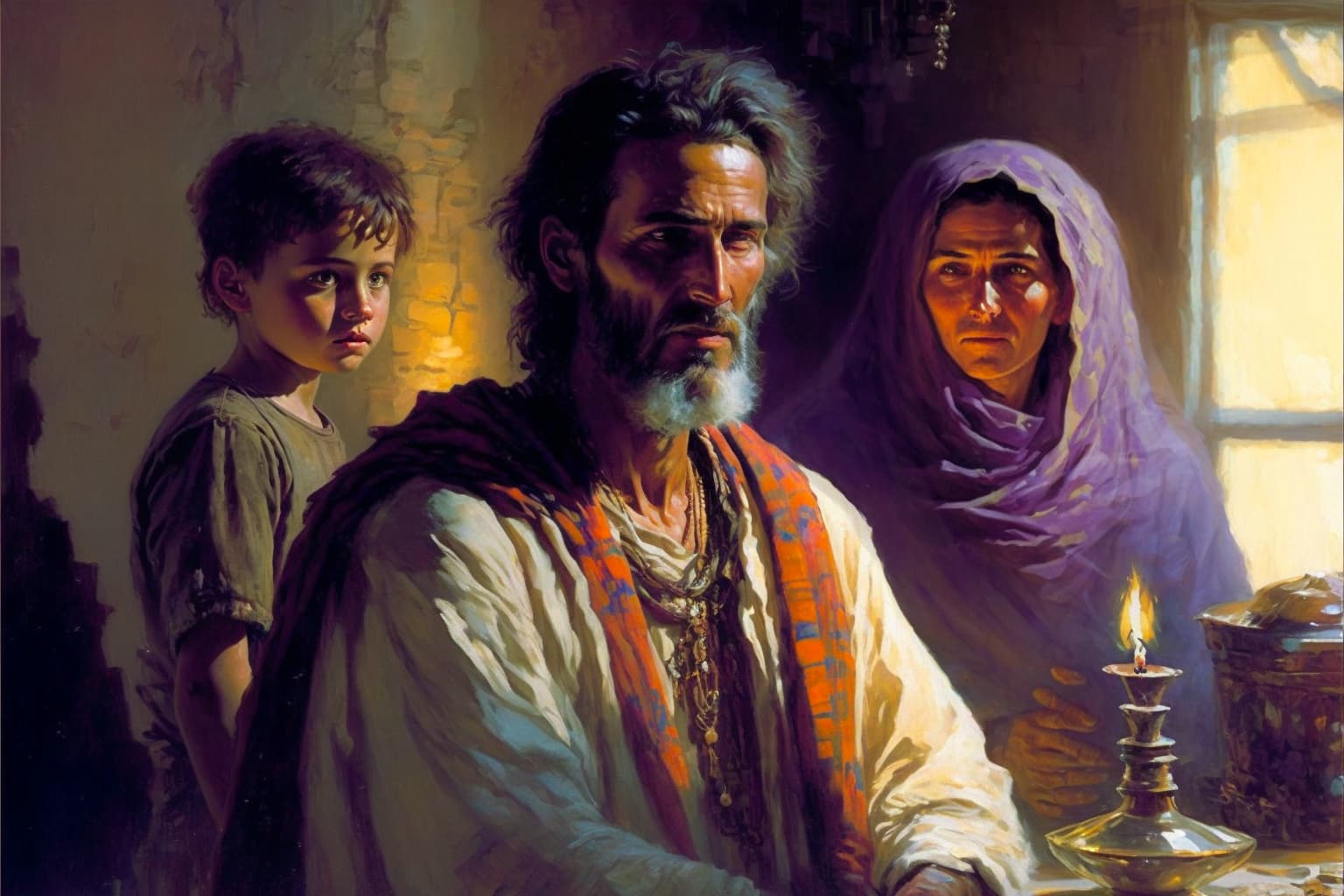Discover Jesus \ Person \Judas Iscariot
Tag
Judas Iscariot
Judas joined John the Baptist's group but was disowned by his Sadducee parents. He became the twelfth apostle, serving as the group's treasurer. Misunderstandings and vengefulness led him to betray Jesus.

Table of Contents
Summary
Judas Iscariot was born in 5 BCE, in Kerioth, a village in southern Judea. He was the only child of Jewish parents. The family moved to Jericho when Judas was a boy.
Judas’ parents were Sadducees and when their grown son joined John the Baptist’s group, they disowned him. One day, while Judas was with John’s group, he was asked by Nathaniel to become a follower of Jesus. He was thirty, unmarried, and the twelfth and last apostle to be selected. He and the other apostles were ordained by Jesus on January 12, 27 CE. His role was treasurer of the group, an assignment he faithfully discharged for four years.
Judas was a spoiled child who became a vengeful, intolerant man. He misunderstood Jesus’ mission and questioned Jesus’ wisdom and decisions. These factors, and others, led to the betrayal of Jesus. Upon recognizing his mistake, on the day of Jesus’ death, Judas committed suicide.
Early Life
Judas was born in Kerioth, a small town in southern Judea. He was the only son of wealthy but unwise parents. Simon, his father, moved the family to Jericho when Judas was a lad. He was a businessman and young Judas became his assistant. Judas was a pampered and spoiled child who grew up believing himself important and superior. Because of this distorted self-appraisal, he became a poor loser, quick to criticize, to hate, to suspect, and to seek revenge.
When Judas matured, he became interested in the preaching of John the Baptist. Judas’ parents were both Sadducees who opposed John’s teachings. After joining John, his parents disowned him. He was looking for employment in a fish-drying business in Tarichea when the sixth apostle, Nathaniel, approached him about joining Jesus’ group of apostles.
"Judas as a child" - by Midjourney.ai and Gary Tonge
Life as an Apostle
Nathaniel chose Judas mainly because of his business experience. Judas was thirty and unmarried when he joined Jesus’ group. He was the only Judean, the other eleven were from Galilee. He and Nathaniel were the best educated of the group. Andrew, as chief of the apostles, appointed Judas as their treasurer. Judas was a good businessman, a far-seeing and able financier. He took this responsibility seriously, and during his four years with the group, Judas never failed as its treasurer. He kept the group’s money and a record of expenses; he estimated budgets for Matthew who was responsible for gathering funds, and he distributed these funds when and where Andrew authorized to do so.
Reasons for the Betrayal
As a follower of John the Baptist before becoming an apostle, Judas asked Jesus why nothing was being done to get John out of prison. He was disappointed with Jesus’ apparent lack of concern. Because of pride, Judas resented being corrected, which Jesus had to do on more than one occasion. Pride and his superior attitude also kept Judas from forming close relations with Jesus and the other apostles. Judas was an antisocial and hypercritical individual who kept score of perceived wrongs and refused to engage in friendly exchanges. He also was prejudiced against Samaritans and Galileans. The fact that all the other apostles were from Galilee, and that Jesus preached love for Samaritans and other gentiles, only increased Judas’s long-held prejudices.
When Jesus refused to be crowned "king of the Jews" at the feeding of the five thousand, Judas thought him cowardly and timid. Jesus knew Judas was a risk, but he wanted his twelfth apostle to have every chance to "enter the (spiritual) kingdom" with the others. The teacher did everything possible to persuade the student but nothing could be done to save one who refused to give up pride, anger, revenge, and personal isolation.
Judas never learned to deal with disappointment, to confide in his fellow apostles, to forgive, to face facts, or to realize that spiritual rewards don’t always come immediately. When Jesus sent the apostles to pray, Judas instead nursed his wounded pride and plotted revenge. And he was very sensitive to ridicule for following Jesus. When his Sadducean friends chided him, Judas burned with shame and embarrassment.
One of the final episodes that led to the betrayal was Jesus’ decision to enter Jerusalem on a donkey during Passover. That and another incident, when a wealthy female admirer poured expensive incense on Jesus’ feet, tipped the balance for betrayal. Judas protested, calling it a waste and saying the money would be better spent feeding the poor. When Jesus rebuked him and praised the admirer for her love and faith, Judas was angered to the point of vengefulness. He then decided he would get even for all the hurt that Jesus had caused him. Six days later, he made a deal to lead authorities to Jesus.
"Judas as treasurer" - by Midjourney.ai and Gary Tonge
Arranging the Betrayal
Once Judas had decided that Jesus was not the expected "deliverer," the messiah, he met with a group of family and friends. When Judas told them he wanted to withdraw from Jesus’ group, they encouraged it and said he would receive great honors for doing so. His cousin suggested a meeting with Caiaphas, high priests of the Sanhedrin. It was there that Judas said he would renounce Jesus and point him out to the arresting authorities. Caiaphas promised Judas an unnamed reward for this service.
At the Last Supper
Jesus arranged a "Last Supper" with his apostles. They arrived before Jesus, and Judas was quick to take the preferred seat at the host’s left, even though he had already decided to betray Jesus. When Jesus arrived and said he would wash their feet, Judas took this as another sign of Jesus’ unworthiness. Jesus knew Judas intended to betray him, and when he told the others there was a traitor among them, Judas dared to ask, "Is it I?" When Judas realized Jesus knew his plan, he abruptly left, going to his cousin’s home and together they went to the captain of the temple guards.
"Judas at the arrest" - by Midjourney.ai and Gary Tonge
The Arrest
Judas led the guards to the upper room, the site of the Last Supper, but Jesus and the apostles had already left. Judas then asked for more soldiers to go to Gethsemane, where he knew Jesus and the others were camped. When they found Jesus alone at an olive press, he asked the captain of the guard, "Whom do you seek?" When he answered, "Jesus of Nazareth," Jesus replied, "I am he." Despite this attempt by Jesus to save Judas from actual betrayal, Judas kissed Jesus to identify him, just as he had promised.
When the apostles and others at the camp noticed the guards’ torches and saw Jesus at the olive press, they came to fight for him. But he commanded them to lay down their arms. When Jesus was being led away, an order was given to arrest his supporters, but they fled, escaping up a ravine.
Judas thought he would be richly rewarded for betraying Jesus. But his motive was not money, it was done for self-glorification and to avenge the hurts he suffered. He expected to be praised and honored for his renunciation and betrayal of Jesus. When he went to the temple to receive his reward, a servant of Caiaphas took Judas aside and gave him thirty pieces of silver. Judas was then dismissed without the least praise. The Sanhedrin court’s obvious contempt for Judas the traitor stunned him into realizing what he had done, committed the worst possible evil, the betrayal of a friend, even a God incarnate.
Death
In his grief and despair, Judas charged into the court shouting his remorse. When the members of the court scoffed, Judas threw the silver pieces on the temple floor and went out to the street. He wandered outside the city gates and climbed up a rocky peak. There he tied one end of his garment to an overhanging tree and the other end around his neck. He then made a suicidal leap, but the knot gave way and he fell to his death on the rocks below.
Legacy
The apostles were horrified and stunned by Judas’ betrayal. Jesus only pitied the man. He had warned Judas many times that he was drifting into spiritual danger. And when the final crisis came, Judas chose pride and revenge over humility and fraternity. Forever after that fateful decision the name Judas has been equated with betrayal.
After Jesus’ last post-resurrection appearance, Peter called a meeting of the apostles to choose a replacement for Judas. A man named Matthias was selected.
Suggested Reading from this Essay

Timeline
29 CE
30 CE
Related People
The Twelve Apostles
Group
Jesus-Judas Iscariot
Relationship
Related Topics
What Led Judas Iscariot to Betray Jesus?
Resentment and self-importance led to his betrayal.
The Master's Attitudes
Jesus embodied love, mercy, wisdom, and God’s will.
Contributors
André Radatus, Rick Warren, Gary Tonge
 "Judas as a child" - by Midjourney.ai and Gary Tonge
"Judas as a child" - by Midjourney.ai and Gary Tonge "Judas as treasurer" - by Midjourney.ai and Gary Tonge
"Judas as treasurer" - by Midjourney.ai and Gary Tonge "Judas at the arrest" - by Midjourney.ai and Gary Tonge
"Judas at the arrest" - by Midjourney.ai and Gary Tonge